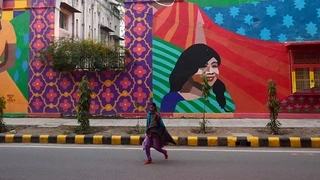
Women’s Voices From the Indo-Pacific
Project Experts
About the Project
The Indo-Pacific is a critical region shaping the future of the United States’ role in the world and its competition with China. Yet many of the most influential voices from the United States’ important democratic partners – Australia, India, Japan, New Zealand, and South Korea -- go unrecognized in U.S. policy and media circles. A number of these are women, whose established leadership and perspectives in various fields – political, economic, industrial, scientific, and social -- are critical to any strong understanding of their political landscapes and relationships with the United States.
CFR’s Women’s Voices From the Indo-Pacific highlights the expertise of powerful women across five U.S. democratic partner countries in the Indo-Pacific. Through this project, CFR publishes interviews with prominent women from these countries whose work influences not only the U.S. bilateral relationship with their respective countries, but also their roles in the Indo-Pacific and the world. Each interview will feature the highlighted woman's work and analysis on emerging dynamics in her sphere of influence and how they matter for both the Indo-Pacific and the United States. Think of it as a roadmap to understanding both policymaking in the Indo-Pacific and the game-changing women who shape it.
-
Miura Mari, a professor of political science at Sophia University, helps build a path to gender parity in Japanese politics.
-
Itochu Corporation Managing Executive Officer Chino Mitsuru Claire shares about her path to corporate leadership.
-
Japan Broadcasting Corporation (NHK) Special Affairs Commentator Doden Aiko offers her insights from working as a correspondent and field reporter around the world.
-
Governor of Tokyo Koike Yuriko shares her thoughts on gender equality issues in Japan and how local government policy can make a difference.
-
After a yearlong focus on India, the Women’s Voices from the Indo-Pacific Project now shifts to another important U.S. democratic partner, Japan.
-
By serving as convening hubs for diverse stakeholders to come together and discuss pressing policy concerns, Indian think tanks help U.S. policymakers understand local viewpoints.
-
India has one of the world’s largest youth populations. This trend is an asset as long as young people can receive an education and develop their skills.
-
The erosion of press freedoms is just one example of India’s authoritarian turn. If India’s democracy weakens further, can the United States continue to view it as a counterpoint to China?
-
Regional parties help protect India’s democracy, secularism, and diversity. Taking away states’ rights will only hurt the country.
-
India’s many political parties represent the country’s great diversity. But India’s turn toward majoritarianism poses risks for its democracy.
-
In India, farmers own high-value land but cannot translate land into wealth. New models of agriculture and ethical entrepreneurship can fix this.
-
To succeed in India, U.S. companies need to understand state politics and choose the right local partner.
-
India’s constitution guarantees the rights to have a good life, vote, and speak freely, but these are not always respected, leading to an erosion of democracy.
-
India’s conservationists face increasing challenges as the country prioritizes economic growth over environmental protection.
-
The United States should learn from the strengths of India's technology industry.
-
With one of the world’s largest education systems, India has struggled to reach all children and ensure quality teaching and learning.
-
As competition with China grows, India and the United States should boost cooperation on space governance.
-
India has made ambitious pledges to reduce its emissions. The United States can help it transition to green energy.
-
India’s entrepreneurs, investors, and philanthropists are increasingly representative of the country’s diversity. They are playing a critical role in addressing India’s problems.
More from this Program
Project
Project
 Online Store
Online Store


